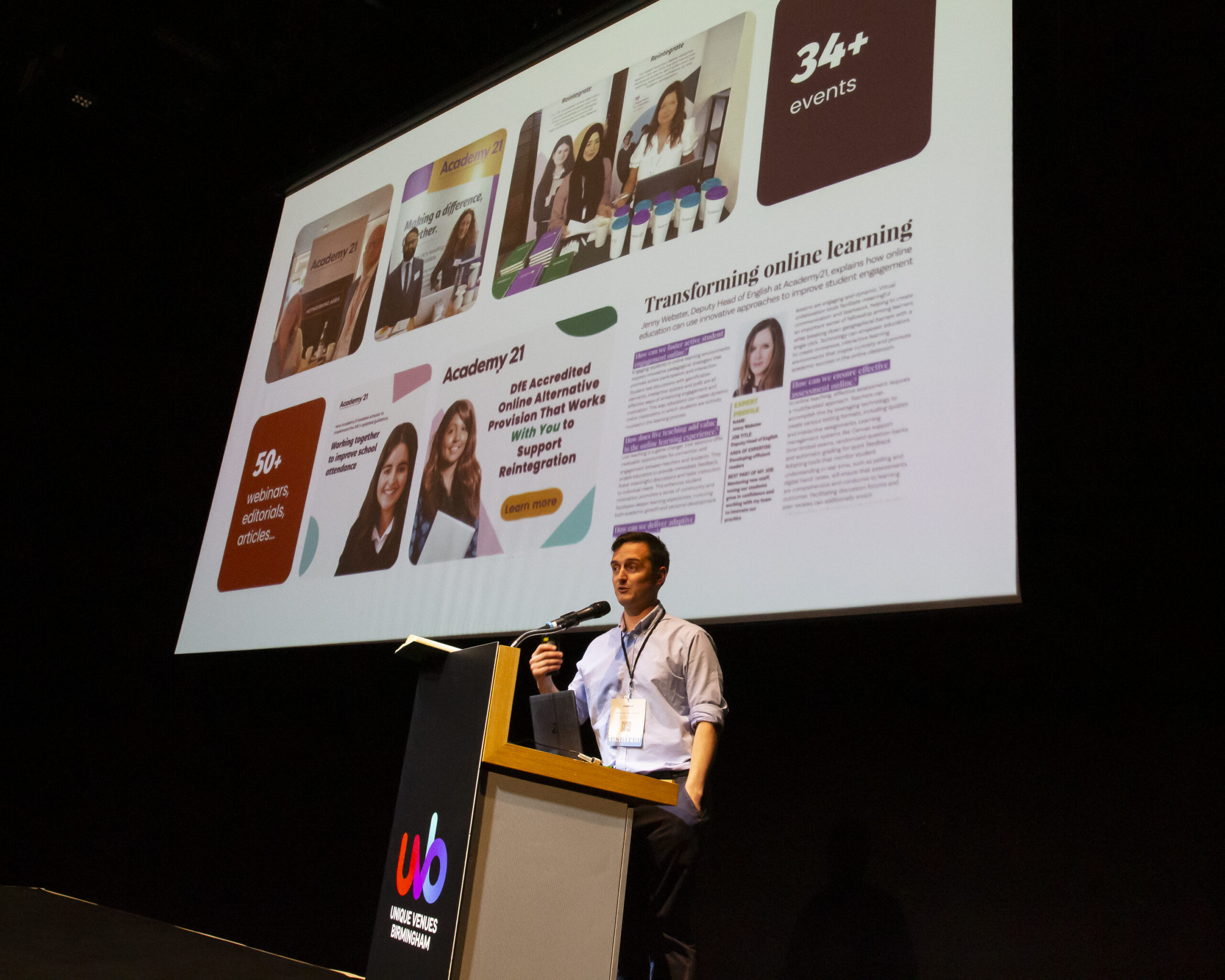What matters in continuing professional development for online teaching
High-quality live teaching matters in online education, so high-quality professional development is vital.

Teachers play a pivotal role in translating subject knowledge into meaningful learning experiences, but this is a complex and ever-changing pursuit! To invest in our students and ensure that they engage effectively, we must invest in our teachers first through continuing professional development.
What is continuing professional development?
Continuing professional development (CPD) encompasses a range of activities that enhance teacher knowledge, skills, and practices to improve student outcomes. It can range from opportunities such as workshops, courses, and conferences to learning experiences like peer observations, collaborative planning, and self-reflection. Effective professional development is continuous, evidence-based, and aligned with teachers’ needs and school priorities.
Why continuing professional development for teachers is crucial
Teacher development is central to outcomes for young people; it matters significantly according to a range of evidence. For example, the Education Endowment Foundation states, “The best available evidence indicates that great teaching is the most important lever schools have to improve outcomes for their pupils.”
Similarly, NFER reinforces that the quality of teaching is the most important factor affecting children’s attainment within a school environment, particularly impacting children from disadvantaged backgrounds. It states, “Teaching strategies based on robust evidence, coupled with the careful use of assessment, can improve teacher effectiveness and children’s outcomes.”

Knowing this, we can design professional development initiatives that equip teachers with practical, evidence-based strategies tailored to their classrooms.
In online settings, this also means equipping teachers to navigate digital platforms, foster engagement in virtual classrooms, and adapt their pedagogy for remote and hybrid learning environments.
Continuing teacher professional development in online settings
Online education settings, like brick-and-mortar ones, must commit to impactful, innovative development opportunities for our staff. Moreover, they must be responsive to students’ evolving needs and technological capabilities.
This reality, for example, is why Academy21 opts for live teaching, supported by technology, to make all learning inclusive and accessible to learners.
Decisions like this are evidence of decision-making centred on the student and of maximising the use of skilled teachers that we want to develop and celebrate. Indeed, investing in our staff means we invest in our students—nothing matters more.
Below are some areas we focus on when developing our colleagues online.
1. Distributed leadership
One of our first principles is to recognise that many best practices are already in classrooms. These may range from adept assessment for learning using digital tools to relational and motivational training and precise developmental feedback that uses carefully crafted and catalogued online resources. Our professional development prioritises distributed leadership by identifying and using our staff’s skills to train colleagues and champion effective teaching and learning approaches.
Harnessing the expertise within our teaching body is a savvy and sensible use of resources. Our teams are led by passionate and knowledgeable subject leaders. However, the purpose of distributed leadership is to push even further and increase leadership capacity, giving colleagues ownership by empowering them to lead ideas within teams and amongst peers. Thus, we design opportunities to ensure that teachers doing great work can capture, exemplify, and share what they’ve done and how it works. There is dedicated time set aside for our professional development programme every week to support those more incidental and ongoing experiences teachers take part in day-in-day-out.
2. Community-based
We ensure our professional development is community-based, collaborative, and supported by time to share and examine teachers’ and students’ experiences. Using a community of practice model, colleagues spend time in cross-curricular groups, regularly interacting to share reflections through joint activities, discussions, information sharing, and relationship building.
One example of how we embed this collaborative approach is through our Inset week, where staff come together for a series of focused development sessions.
During Inset week, teachers participate in training, workshops, and group discussions, all designed to foster community and further develop their professional skills. This week allows for deep dives into best practices, including ways to enhance student engagement, implement new technology tools, and improve classroom management strategies. The cross-disciplinary nature of this works excellently, with colleagues able to take back learning to their classrooms and teams to experiment and improve our environment.

Communities such as these are squarely focused on enhancing the student experience, colleague enjoyment, and professional interest. They connect people to share experiences, resources, strategies, innovations, and support – a pooling of ideas. The transmission and expansion of knowledge and expertise gained by bringing practitioners with diverse experiences together around a common purpose is noticeable.
Of course, maintaining relevance is essential. This means ensuring that the topics and activities in these communities align with the needs of both teachers and students. Overall, however, there are inherent benefits to this sharing and strengthening of inter-team understanding and a sense of purpose.
3. Contextually relevant
Each subject is naturally different, with unique skills and hierarchies of knowledge—being online is no different and brings its own considerations. Recognising this and leaving space for subject-specific development and discussion is important. CPD must have both an online and a disciplinary lens to tackle the unique circumstances and opportunities of the online space.
There are many questions to examine:
- How do we ensure all pupils, regardless of need, can participate?
- How do we ‘break the fourth wall’ and ensure highly engaging teacher instruction?
- How do we continue to safeguard young people in online settings?
- How do we develop collaboration online safely?
- How do we successfully assess for learning online, then adapt teaching?
- How do we integrate tools for participation, assessment, and questioning fluidly?
Considering contextual relevance, we ensure a culture that embraces innovation and seeks to grasp the opportunities presented by digital platforms while embedding Quality First Inclusive Teaching into all aspects of our teaching practice.
4. Practical and Innovative
Lastly, our professional development is curious and evaluative. It must include examples of strategies in practice—video, narratives, and the opportunity to observe practice. Development opportunities need to be applicable and practical, not just theoretical.
When it comes to innovation, we scan the technological landscape and work out what we want to be able to do first rather than taking tools ‘off-the-shelf’. Being led by need and demand is key. Once done, we think carefully about how technology—an assessment tool, a collaborative platform, a visual aid—might strengthen practice and how we can use it ‘correctly’ for that purpose.
We make accessibility a prime concern, asking ourselves what we can train our teachers to do to increase access for our students. Overall, this approach has delivered holistic results in our setting. Over 90% of our learners feel more confident in their learning now that they are with Academy21.
Equally, our recent OFSTED inspection shared the following, a direct result of the confidence and craft of our teachers:
"Teachers demonstrate strong subject knowledge alongside a secure understanding of the technical knowledge and skills needed to operate in an online environment. The positive learning environment they create promotes pupils’ confidence, and this has an important impact on the progress they go on to make."
Empowering educators: The key to effective online teaching
In conclusion, professional development for online teaching is not just necessary; it is a cornerstone of effective education in the digital age. By focusing on distributed leadership, community-based learning, contextual relevance, and practical uses for innovations, we ensure that our educators are equipped to maximise the opportunities for online teaching. This commitment to continuous improvement not only enhances our teachers’ skills but also enriches our students’ learning experiences, paving the way for their success in an increasingly digital world and their lives more generally.



